Verizon and Spectrum have been longtime heavy hitters in the home internet game. Verizon started out as a DSL service provider, then launched their Fios fiber optic service in select areas, and most recently has turned their attention to their new 5G home internet service.
Spectrum started out as Charter Communications in 1993 and was rebranded as Spectrum in 2014. Spectrum has been a DOCSIS cable modem technology for many years now and has remained focused on providing high-speed internet via its fiber/coax hybrid network.
Verizon 5G Home Internet and Spectrum both have several compelling reasons that make them worth considering. They both also have a few drawbacks that might make them a poor choice for your home internet needs. Verizon 5G or Spectrum, which should you choose for your home internet?
| Verizon 5G Home Internet | Spectrum | |
|---|---|---|
| Monthly Service Cost | $25 – $60 | $49 – $89 |
| Money Back Guarantee | 30 Days | 30 Days |
| Contracts | No | No |
| Data Caps | No | No |
| Download Speeds | 20 – 500 Mbps | 300 – 1000 Mbps |
| Upload Speeds | 5 – 35 Mbps | 10 – 35 Mbps |
| Latency (Ping) | 40 ms – 95 ms | 25 ms – 30 ms |
| Ping Stability | Poor/Fair | Very Good |
| Jitter | 20 ms – 55 ms | 1 ms – 3 ms |
| Type of IP Address Issued | CGNAT / Private IP | Dynamic Public IP |
| Type of Technology | 5G Cellular (Fixed Wireless) | Fiber / DOCSIS 3.1 (Cable) |
| Release Date | 2018 | 1993 as Charter 2014 as Spectrum |
Table of Contents
5 Key Differences Between Verizon 5G Internet and Spectrum
- Verizon 5G Home Internet is less expensive, especially with a Verizon cell phone plan.
- Verizon 5G Home Internet can be self-installed in as little as 15 minutes.
- Spectrum Internet offers a much more stable connection, especially during peak hours of the day.
- Spectrum Internet download speeds are significantly faster than Verizon 5G Home Internet.
- Spectrum Internet works well for gaming, Zoom meetings, and VoIP, Verizon 5G generally does not.
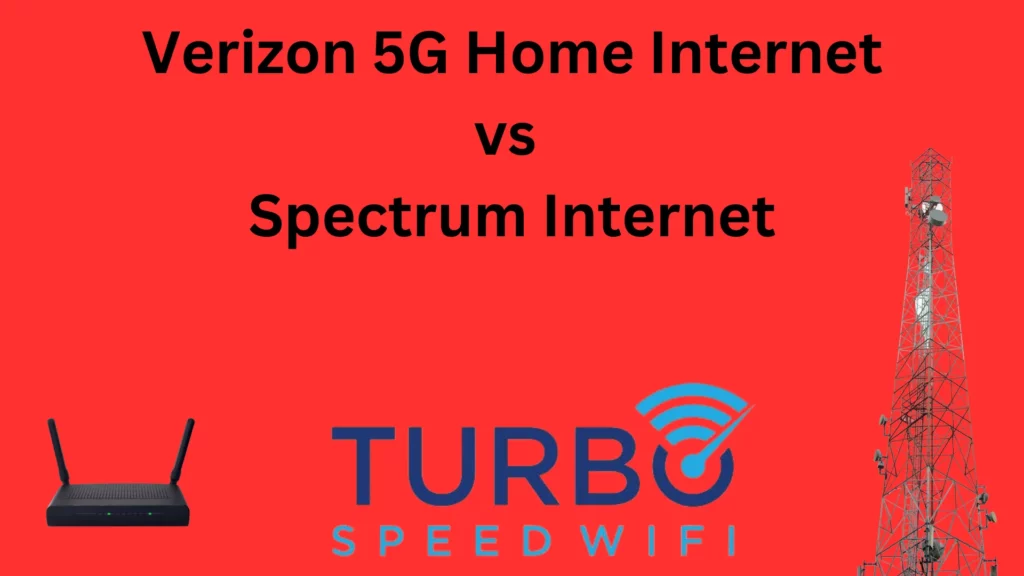
Who is Verizon 5G Home Internet Best Suited For
Verizon 5G Home Internet is a good choice for a portion of people living in the United States. It is also a poor choice for others. Consider Verizon 5G Home Internet if the following applies to you.
- You are not a gamer.
- You do not work from home or run a business from home.
- You do not subscribe to cable TV or are thinking about cutting the cord soon.
- You are okay with slower internet performance during peak hours of the day.
- Saving money on your internet bill is a top priority for you.
- You have a good strong Verizon 5G signal in your home.
Even more compelling is the value for people with select Verizon cell phone plans. If you have a qualifying Verizon Unlimited plan for your cell phone, you may be able to get Verizon 5G Home Internet for as little as $25 per month. This is a great value, to say the least.
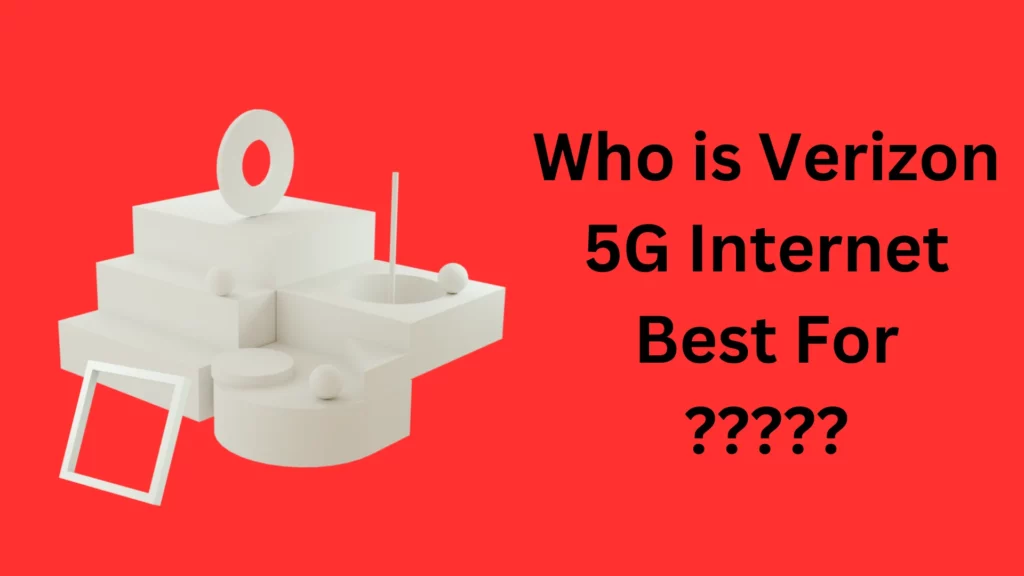
Who is Spectrum Internet Best Suited For
Spectrum Internet also has a number of reasons that it might be a good choice for you. Spectrum is a good choice for a large number of people. Consider Spectrum Internet if the following applies to you.
- You are looking to bundle internet with cable TV service.
- You need consistently fast internet during all hours of the day.
- You play online games and want a stable and lag-free connection.
- You work from home or run a business from home and use Zoom, Teams, VoIP, etc.
- You are okay with paying a little more money for your internet to get better performance.
Spectrum Internet offers good connection stability that makes it suitable for online gaming as well as videoconferencing applications such as Zoom, Teams, and Webex. If you work from home, run a business from home, or simply need reliable internet that offers consistent performance, Spectrum is a better choice than Verizon 5G Home Internet.
Another thing to note is bundle pricing. If you are a Spectrum TV customer, you are almost certainly going to be paying more if you get your internet from Verizon and your TV from Spectrum. However, if you are thinking about cutting the cord on your Spectrum TV service, Verizon 5G Home Internet might be the perfect incentive for you to get rid of Spectrum altogether.
Verizon 5G Home Internet vs Spectrum Comparison
Verizon 5G Home Internet has an overall advantage in these areas.
Verizon 5G Pros
- Pricing on its own
- Pricing when bundled with a qualifying cell phone plan
- Ease of installation
- Speed of installation
These are the key advantages of Verizon 5G Home Internet. Based on my hands-on testing of Verizon 5G Home Internet, I was hard-pressed to find any other compelling reasons to choose Verizon 5G over Spectrum.
Spectrum Internet has an overall advantage in these areas.
Spectrum Pros
- Pricing when bundled with cable TV service
- Download speeds
- Upload speeds
- Latency (ping)
- Stability
- Reliability
- Availability
- Gaming performance
- Port forwarding
- Using your own router
As you can see, Spectrum pretty much wins in all performance categories, oftentimes by a significant margin. Spectrum is also less expensive if you plan to subscribe to cable TV in addition to internet service.
The only people that Spectrum might not be the better choice for are internet customers that are willing to sacrifice performance and reliability to save a few bucks per month on service costs. This is especially true for anyone with a qualifying Verizon Unlimited plan that knocks your home internet service down to $25 per month with Verizon 5G Home Internet.
Verizon 5G vs Spectrum Home Internet Price Comparison
| Verizon 5G Home Internet | Spectrum Internet | |
| Price with qualifying Verizon cell phone plan | $25 per month | ————— |
| Price without a Verizon cell phone plan | $50 per month | $49 – $89 per month |
| Modem rental fee | Included | Included |
| Taxes and service fees | Included | $5 – $15 per month extra |
Everyone wants to get a good price on their internet service. The price of internet service in the United States has increased at a rate faster than with other industries. Getting a good price on internet service requires shopping around and knowing when to jump ship by switching providers.
Verizon 5G Home Internet is priced very competitively at $50 per month on its own or $25 per month with select Verizon cell phone plans. This is truly disruptive pricing at its finest. Verizon is aggressively trying to get people to cut the cord with their cable companies and switch to 5G Home Internet.
Another benefit to Verizon 5G Home Internet is that all taxes and fees, plus the modem rental, are included at the advertised $25 or $50 price points. This is similar to what T-Mobile is offering with their T-Mobile Home Internet plans. It is also worth mentioning that with Verizon 5G Home Internet, you get unlimited data.
Spectrum offers three popular internet plans ranging from $49 to $89 per month. Taxes and fees are not included in the price with Spectrum. A basic cable modem is also included. Note that if you want Spectrum to provide you with a WiFi router, that is $5 per month extra. Although, most people are better off using their own instead anyways.
Another difference between Verizon 5G Home Internet and Spectrum is the use of promotional pricing. Spectrum pricing tends to increase after a 6 or 12-month promotion expires. This can surprise some customers when their bill suddenly jumps up in price.
All Spectrum plans currently come with unlimited data. There have been some talks about Spectrum potentially implementing data caps in the future, but that has not been officially confirmed. Most likely, if Spectrum does decide to implement data caps, they will be similar to the 1.2 TB caps imposed by Xfinity.
Pricing with Verizon 5G is generally less expensive than with Spectrum. For people with a qualifying Verizon cell phone plan, the difference is even more pronounced. The only case where Spectrum is likely to be cheaper is if bundled with Spectrum TV service or Spectrum Mobile service.
Neither Spectrum nor Verizon requires contracts with their home internet service. There are a number od pros and cons to this. No contracts mean you can cancel at any time. No contracts also mean your bill could change at any time. Not having contracts is both a blessing and a curse.
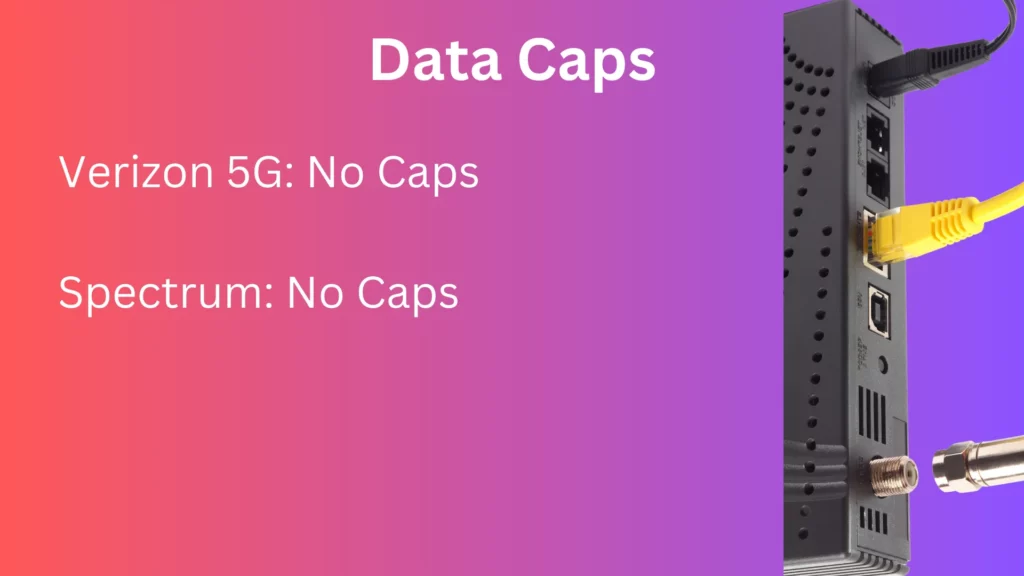
Verizon 5G vs Spectrum Speed Comparison
Most people want an internet connection that offers high speeds. Speed is on of the most commonly cited complaints about an internet connection. Nobody likes slow internet speeds.
When we talk about internet speeds, were are really referring to bandwidth. Bandwidth is really a measurement of capacity. What we refer to as having fast internet speeds really means having lots of bandwidth capacity.
Based on my testing, average speeds are significantly higher with spectrum. For this comparison table, I used the Gigabit Spectrum plan and the only speed tier offered by Verizon 5G Home Internet.
| Verizon 5G Home Internet | Xfinity Internet | |
| Average Download Speeds (Peak Hours) | 65 Mbps | 943 Mbps |
| Average Download Speeds (Off Peak Hours) | 115 Mbps | 946 Mbps |
| Average Upload Speeds (Peak Hours) | 10 Mbps | 35 Mbps |
| Average Upload Speeds (Off Peak Hours) | 20 Mbps | 35 Mbps |
Download and upload performance was much better with Spectrum than with Verizon 5G. This was especially true during peak hours when most people tend to be online the most. With the Spectrum Gigabit plan, I was getting pretty much max speeds all of the time. There was very little variance from day to day or from hour to hour.
The same could not be said for Verizon 5G Internet. Speeds were all over the board and would swing wildly from minute to minute. However, it is important to note that the fastest single speed test I ran with Verizon 5G Home Internet came it a 218 Mbps download, and 29 Mbps upload. This was a one-time occurrence at 2:00 AM on a weeknight when virtually nobody was online.
Spectrum consistently demonstrated 300 Mbps – 320 Mbps download speeds on their lowest-tiered plan. The least expensive plan with Spectrum consistently outperformed even the fastest speed I even got with Verizon 5G Home Internet.
Safe to say, if speed is the name of the game for you, Spectrum is a better option than Verizon 5G Home Internet.
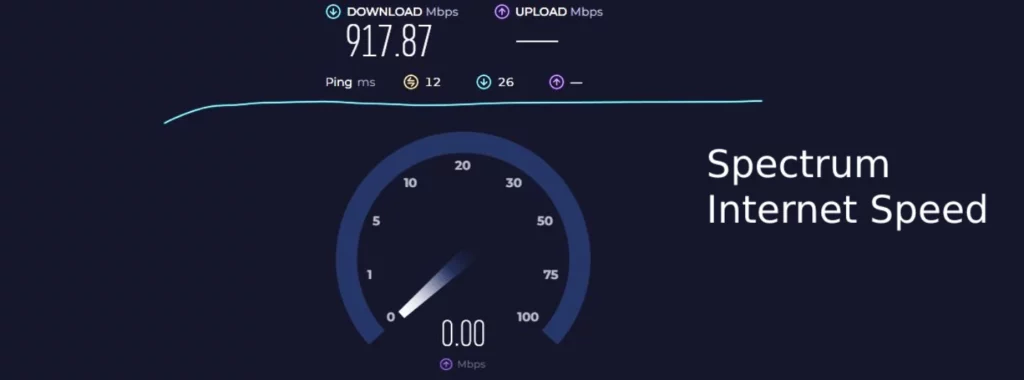
Verizon 5G vs Spectrum Internet Latency (Ping) and Stability
| Verizon 5G Home Internet | Spectrum Internet | |
| Average Ping (Peak Hours) | 120 ms | 28 ms |
| Average Ping (Off Peak Hours) | 60 ms | 26 ms |
| Average Jitter (Peak Hours) | 55 ms | 3 ms |
| Average Jitter (Off Peak Hours) | 20 ms | 2 ms |
Throughout my extensive testing, Spectrum consistently offered a stable ping of between 25 ms and 40 ms. This was at all times of the day, including during peak usage hours. Gaming works decently with Spectrum on both PlayStation Network and Xbox Live.
I was also able to use Zoom and Microsoft Teams to hold virtual meetings with ease when using Spectrum. Stability was equally impressive. There was little variation in latency and jitter with Spectrum. Ping spikes were generally 50 ms or less and were infrequent.
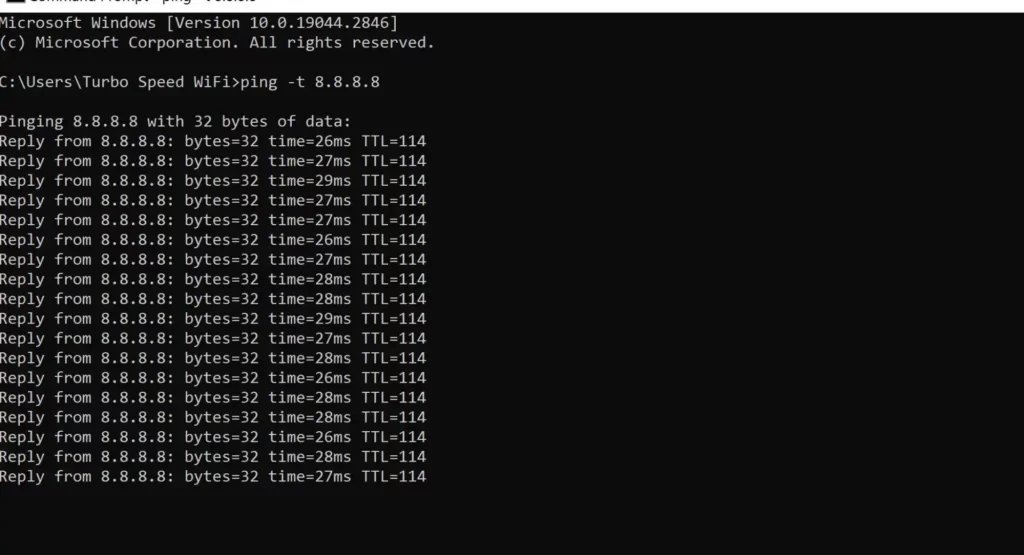
Verizon 5G Home Internet is not great for latency and stability. In my testing, there were times when latency was acceptable, and there were other times when ping was over 200 ms on every request with some timeouts.
The time of day also greatly impacted the performance I was getting with Verizon 5G Internet. During off-peak hours when the cell tower was not congested, latency was generally much lower. I saw pings in the 35 – 70 ms range most of the time during off-peak hours.
During peak hours from about 5 PM – 11 PM, Verizon 5G Home Internet really struggled badly. I would see a latency of 100 ms or higher at all times. I would also get spikes where the ping would be 500+ ms. This would happen on a daily basis and limited how I could use my internet connection greatly.
Gaming, videoconferencing, VoIP, and other latency-sensitive applications were essentially unusable during peak hours during my testing. In fairness to Verizon, it is possible that the particular tower I was connected to was more overcrowded than most. However, the issue of high latency with 5G home internet services appears to be pretty common based on feedback from other users.
Other Considerations to Factor in Your Decision
For many people, price, and speed are going to be the primary factors that determine what ISP they should go with. However, there are other factors that could come into play that you should be aware of. Reliability, customer service, and technical support are also important factors to consider.
Verizon 5G Home Internet vs Spectrum Reliability
Reliability was generally solid with both internet services. Verizon 5G had a few shorter-duration outages that occurred at random.
Spectrum, on the other hand, had a single outage that lasted for about 2 hours and was the result of a car running into a utility pole. I would not give either service the advantage for reliability.
No internet service is 100% reliable, but generally, most people are going to want a service that delivers 99.5% of better reliability over the course of a year. Verizon 5G and Spectrum both offer reliability that is good enough for most people.
If you run a business from home or simply need internet that is going to work no matter what, you will likely want to consider getting two separate internet connections from two separate ISPs. Then you can use a load-balancing router to combine them for additional performance and reliability.
Customer Service and Technical Support
Telecommunications companies, including ISPs and cell phone carriers, are notorious for offering bad customer support. Just how bad is the support for Verizon and Spectrum? I tested calling support for both providers multiple times for both account and technical-related issues.
Based on my experience, I would rate Verizon about a 5 out of 10 for technical support and a 6 out of 10 for billing support. I would rate Spectrum a 3 out of 10 for technical support and an 8 out of 10 for account support.
Both companies were able to answer questions I had about my account. They both varied widely in how long it took to get through to a support rep. Spectrum was better at clarifying my billing-related questions, whereas Verizon required multiple transfers and a lengthy hold.
When it came to tech support, Verizon was the clear winner. Verizon was able to assist me in better optimizing the placement of my 5G home gateway. They were also able to help me force my device to connect to the 5GHz band for faster WiFi speeds.
Spectrum tech support was extremely frustrating to work with. On several occasions, it took more than 2 hours to get through to a tech support rep. Spectrum also made it extremely difficult to get a replacement modem sent after the provided modem stopped powering on at all.
When they did finally send a replacement modem, they provided me with no clear instructions on sending my old defective modem back to them. Eventually, I was told that I could drop it off at a Spectrum Store.
| Verizon | Spectrum | |
| Average Time on Hold (Tech Support) | 13 minutes | 77 minutes |
| Average Time on Hold (Billing Support) | 6 minutes | 3 minutes |
| Average Number of Call Transfers per Call | 2.3 | 3.8 |
Type of IP Address You Get
With Spectrum, you get a dynamically assigned publicly routable IP address with all residential internet plans. This means that you can use features such as port forwarding without issue. It also means that you are much less likely to get CAPTCHA on every other site you visit.
Keep in mind that with Spectrum residential plans, your IP address is not static and can change at any time. In practice, as long as you keep your modem and router powered on 24/7, your IP address will stay the same for months and possibly years at a time.
Verizon 5G Home Internet assigned you a private IP address via CGNAT. You do not get your own publicly routable IP address. This means that you can not use functions such as port forwarding. This is a deal breaker for many online gamers. Not that you would want to game on Verizon 5G Home Internet anyways, as the latency is too high.
Admittedly the type of IP address you are assigned may not matter to most people, but this is something to be aware of if it matters to your needs.
My Overall Ratings for Verizon 5G and Spectrum Home Internet
| Spectrum Internet | Verizon 5G Home Internet | |
| Price | 7/10 | 9/10 |
| Speed | 9/10 | 5/10 |
| Stability | 8/10 | 3/10 |
| Latency | 8/10 | 4/10 |
| Gaming Performance | 7/10 | 4/10 |
| Zoom Call Performance | 8/10 | 4/10 |
| Reliability | 8/10 | 7/10 |
| Availability | 5/10 | 6/10 |
| Customer Service | 3/10 | 5/10 |
| Ease of Canceling Service | 4/10 | 6/10 |
| Overall Score | 67/100 | 53/100 |
Verizon 5G Home Internet: Overall Score 53/100
Spectrum Internet: Overall Score 67/100
Alternatives to Verizon and Spectrum You Should Consider
There are several alternatives to Verizon 5G Home Internet and Spectrum that you should also consider. It is always best to make an informed decision based on all of your potential options for home internet service. Of course, you may not have access to all of these services at your service address. Depending on where you live, you will likely have access to one of these alternatives.
- Verizon Fios
- Starlink Internet
- Xfinity Internet
- AT&T Fiber Internet
- T-Mobile Home Internet
- Fidium Fiber Internet
- Breezeline Internet
Of the ISPs listed above, Verizon Fios, AT&T Fiber, and Fidium Fiber are the top performers based on my first-hand experience using them. However, Breezeline, Xfinity, and Spectrum also perform well for being DOCSIS 3.1-based services. DOCSIS 4.0 is on the horizon, and that will really take cable internet to whole new levels.
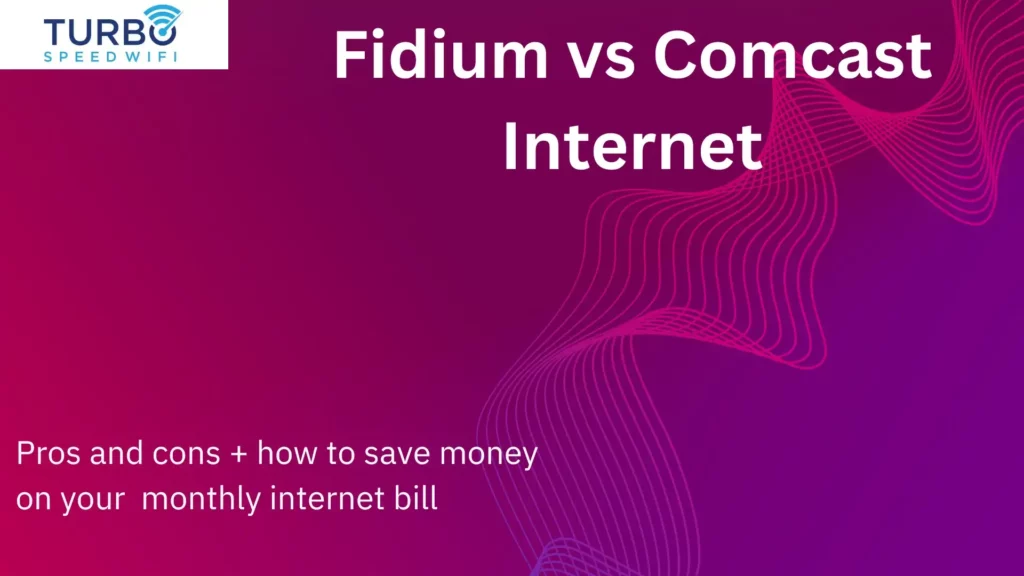
Conclusion: Verizon 5G Internet or Spectrum Home Internet 2023
Spectrum Internet offers better performance than Verizon 5G Home Internet based on my testing and the feedback I have received from others. If you work from home, play online games, run a business from home, or simply want a stable connection to the internet, Spectrum is the better choice.
Even Spectrum’s lowest-priced 300 Mbps plan offers better performance than Verizon 5G in key categories, including download speed, latency, stability, jitter, and reliability.
Spectrum also offers plans that deliver speeds of up to 1 Gbps. This is far faster than what Verizon 5G Home Internet is able to deliver. Spectrum has a range of plans to fit your needs and budget, whereas Verizon only as 2 plans to choose from. Both offer the same download speeds and upload speeds.
Verizon 5G Home Internet is best for people who are looking to save money on their internet bill and are okay with giving up some performance in the process. Verizon 5G is priced aggressively at $50 per month, with all taxes and fees included. For Verizon cell phone customers with an eligible unlimited plan, the prospect of getting home internet from Verizon for $25 per month is even more enticing.
